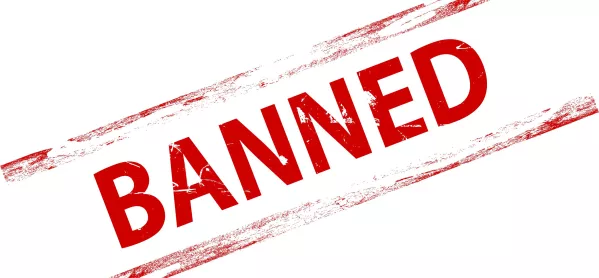- Home
- Banned: Teacher who failed to deal with pupil assault
Banned: Teacher who failed to deal with pupil assault

A teacher who failed to respond adequately after a pupil hit a classmate around the head has been banned from teaching for two years.
Andrew Cushing, 61, was found by a professional conduct panel of the Teaching Regulation Agency to have acted inadequately in dealing with the incident - and initially denied it had happened.
The attack happened in April 2018, when Mr Cushing was working at Orchard Manor School, Dawlish, Devon, (previously called Ratcliffe School), a school for pupils with special educational needs and disabilities (SEND).
The panel was shown CCTV footage of the incident involving two pupils identified as Pupil J and Pupil F, which took place in a computer suite on a Friday afternoon - a time when pupils were allowed to choose their own activities, and teachers were not expected to be actively teaching.
The footage showed Pupil F entering the computer suite and sitting close to Mr Cushing.
The panel’s report states that Pupil F “appeared to be quite agitated, in that he was moving a table, rocking back and forth and knocking items from the table on to the floor…. After a few minutes, Pupil F moves across towards Pupil J and physical contact then occurred. This physical contact could be appropriately described as an assault. Pupil F proceeded to strike Pupil J to the head with what appear to be his fists, on at least nine occasions in quick succession.”
Teacher ‘looked up’ during pupil attack
The panel stated that “pupils in the vicinity appeared to look up as this occurred, though they did not otherwise appear to react”.
The CCTV footage did not include audio.
But the panel noted that Mr Cushing could be seen in the background and while it was not clear whether he witnessed the entire incident, he could “clearly be seen looking up during the course of Pupil F striking Pupil J”.
The report noted that after this occurred, Mr Cushing could be observed on the recording getting up and moving towards a corner of the room, not directly towards the pupils. Then, when he did move towards the pupils, and stood close to Pupil J, Pupil F appeared to kick out at Pupil J.
The panel also found that while Mr Cushing could not have “anticipated an incident as violent as that which occurred”, his response to the initial incident was “inadequate”.
“He did not appear to engage with the incident other than, at best on his account, to move a computer and ask Pupil F to calm down,” the panel report notes.
The panel heard from Mr Cushing’s line manager at the time, who said that as Pupil F had entered the room in an agitated state, it was incumbent on Mr Cushing to be proactive and deploy strategies such as distraction or humour to control the situation.
But Mr Cushing did none of these things, the panel report states.
It also found that Mr Cushing did not call for support, although teaching staff at the school had radios which were to be used when support was required, did not check on Pupil J’s welfare after the incident and did not report the incident.
The school found out what had happened when the headteacher was emailed by the parent of Pupil J, who said that their child had been attacked during the course of a lesson supervised by Mr Cushing.
But when the school tried to investigate what had happened, the panel found that Mr Cushing had initially told a colleague that he did not know about the incident and said that no one had any knowledge of the incident.
The panel decided: “This amounted to a deception and was dishonest by the standards of ordinary decent people.”
It concluded that while Mr Cushing had an otherwise unblemished record in the context of a long career and was well-liked within the school, where he had worked since September 2017 - in this case Mr Cushing had demonstrated “no insight into his failings or shown regret or remorse”.
The panel concluded that in failing to act appropriately in relation to a serious safeguarding incident Mr Cushing was guilty of unacceptable professional conduct and conduct that may bring the profession into disrepute.
The panel recommended that Mr Cushing was banned from teaching with the chance to apply for the ban to be lifted in two years’ time.
The secretary of state’s decision-maker confirmed this recommendation.
Keep reading for just £1 per month
You've reached your limit of free articles this month. Subscribe for £1 per month for three months and get:
- Unlimited access to all Tes magazine content
- Exclusive subscriber-only stories
- Award-winning email newsletters



